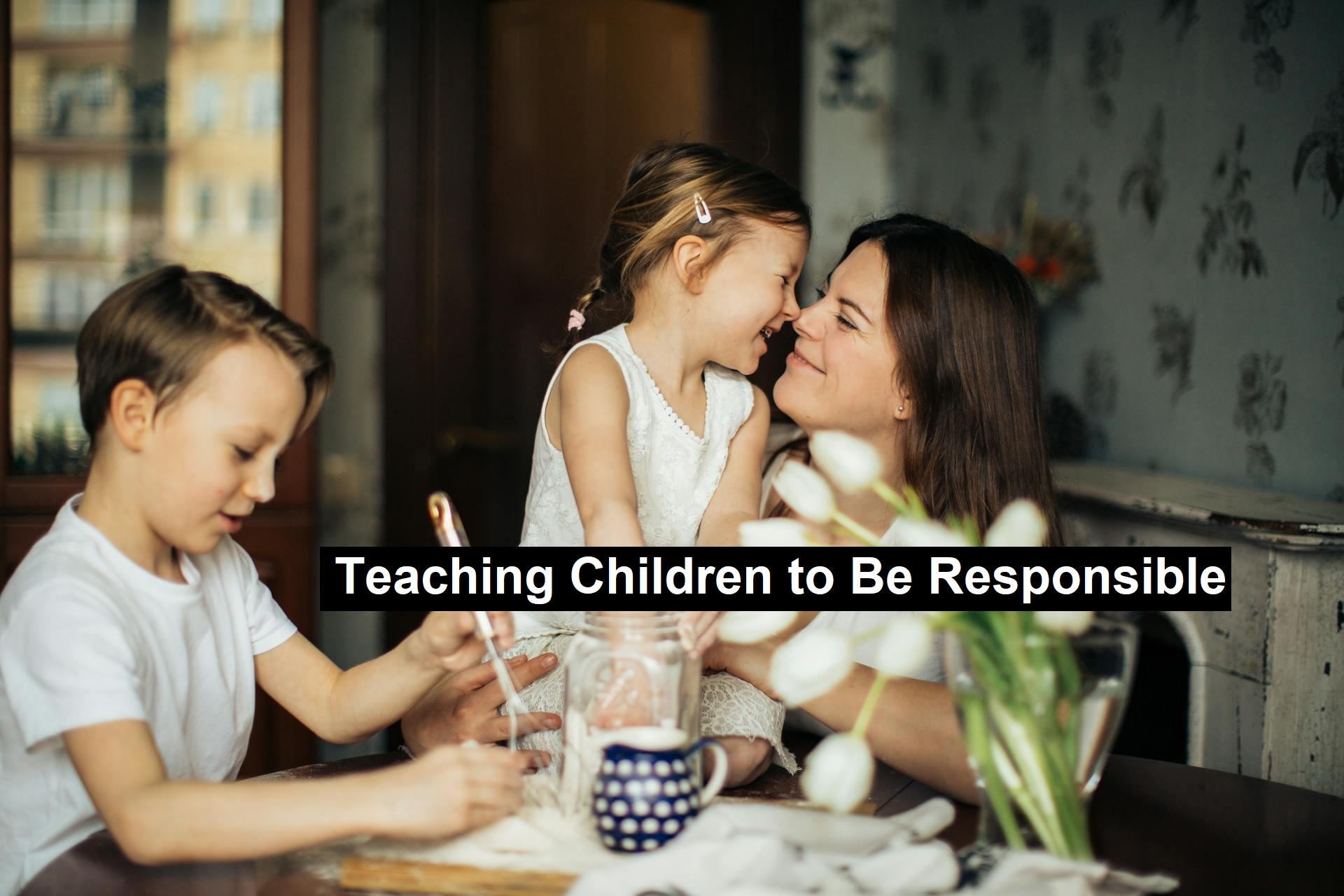Teaching Children to Be Responsible
In today’s fast-paced world, instilling the value of responsibility in children from an early age is crucial. Early responsibilities lay the foundation for discipline, self-esteem, and the skills necessary for navigating adulthood. By teaching children to manage tasks and understand the consequences of their actions, we prepare them to become reliable and independent adults. While much of this learning can be done at school, we mustn’t forget that home life is also a great place to start building these skills.
Understanding Responsibility
Responsibility means being accountable for one’s actions and fulfilling one’s duties. Children need to understand that being responsible involves completing tasks, making decisions, and accepting the consequences of their actions. Explain that responsibility is about taking charge of one’s life and contributing positively to the family and community. Your kids may want to do nothing more than play, but a fulfilling and meaningful life entails some level of responsibility.
Why Responsibility is Crucial
Responsibility is a crucial life skill because it helps children develop a sense of purpose and self-worth. When children take on responsibilities, they learn to manage their time, prioritise tasks, and work towards goals. These skills are essential for their academic success and future careers. Additionally, responsible children grow into dependable adults who can handle life’s challenges with confidence.
Examples of Responsible Behaviours
To illustrate responsibility, provide examples such as completing homework on time, helping with household chores, and taking care of personal belongings. Emphasise behaviours like keeping promises, telling the truth, and admitting mistakes. Learning this will not only teach your children to treat others with respect and kindness, but also teach them to rely on you as a parent when they feel overwhelmed or incapable of handling a responsibility.
Age-Appropriate Responsibilities
Responsibilities for Different Age Groups
Assigning age-appropriate responsibilities helps children learn gradually and prevents them from feeling overwhelmed. For young children (ages 3-5), simple tasks like picking up toys or putting clothes in the laundry bin are suitable. School-aged children (ages 6-9) can handle more complex tasks like setting the table, feeding pets, and completing homework with minimal supervision. Pre-teens and teenagers (ages 10-15) can be expected to take on responsibilities like babysitting younger siblings, mowing the lawn, and managing their schedules.
Gradually Increase Responsibility
As children grow older, their capacity to handle responsibilities increases. Start with simple tasks and gradually introduce more challenging ones. For example, a young child might begin by helping to water plants, then progress to more demanding tasks like preparing simple meals. This approach builds their confidence and skills incrementally.
Set Expectations and Provide Guidance

Clear expectations and guidance are key to teaching responsibility. Explain tasks in detail and demonstrate how to complete them. Use visual aids like chore charts to help children remember their duties. Don’t forget to regularly check in with them to provide feedback and support, and adjust responsibilities as needed, since everyone has different strengths and weaknesses.
Incorporating Responsibility into Daily Routines
Integrate Responsibility into Everyday Activities
Incorporating responsibility into daily routines makes it a natural part of life. Encourage your kids to take part in household chores and decision-making. Easy, day-to-day tasks are a good start – involve them in meal planning and preparation, setting the table, and tidying up after meals. These activities teach them that responsibility is not a separate chore but an integral part of daily living.
Simple Tasks at Home
There are tons of simple tasks children can do at home to practise responsibility. Young children can help with tasks like sorting laundry, dusting furniture, and watering plants. Older children can take on duties like vacuuming, washing dishes, and organising their rooms. These tasks teach them to care for their environment and contribute to their sense of pride in their own home.
Consistency and Routine
Consistency and routine are crucial in teaching responsibility. Establish regular schedules for chores, homework, and other activities. This helps children develop good habits and understand the importance of fulfilling their responsibilities consistently. A predictable routine also provides a sense of structure, making it easier for your kids to manage their tasks.
Teaching Children to Care for Pets
Empathy and Responsibility through Pet Care
Caring for a pet teaches children empathy and responsibility. Our pets rely on us for food, shelter, and companionship, making it a perfect way to demonstrate the importance of responsible behaviour. Explain that pets have needs and feelings, and taking care of them requires commitment and effort. Whether you have a Dog Doxen or senior Great Dane, both will need the same kind of loving attention.
Specific Tasks for Pet Care
Detail specific tasks children can perform to help care for pets. These tasks include feeding, grooming, cleaning litter boxes or cages, and walking the dog. Assign tasks based on the child’s age and ability. Younger children can help fill water bowls or brush pets, while older children can take on more complex tasks like bathing pets or taking them to the vet.
Supervising Young Children
Supervise younger children to ensure they perform pet care tasks correctly and safely. Our pets are still animals that will react when they get frightened or hurt. Gradually increase their independence as they demonstrate competence and understanding.
Read: The Benefits Of Cooking At Home: Health, Happiness, And Savings
Positive Reinforcement and Encouragement
Positive Reinforcement
Positive reinforcement plays a significant role in teaching responsibility. When kids receive praise or rewards for completing tasks, they feel motivated and appreciated. Positive reinforcement helps build their confidence and reinforces the value of responsible behaviour.
Rewards and Praise
You don’t have to break the bank – simple gestures like verbal praise or extra play/screen time can be effective. For older children, consider rewards like earning privileges or small monetary incentives. The key is to ensure that rewards are meaningful and appropriate for the child’s age and interests.
Handling Mistakes and Teaching Accountability
Teach children that making mistakes is part of learning. When they fail to meet their responsibilities, use it as an opportunity to discuss what went wrong and how to improve. Encourage them to take accountability for their actions and understand the consequences. Guide them through problem-solving steps to find solutions and avoid similar mistakes in the future. If necessary, show them how it’s done before they try it again.
School and Extracurricular Activities
Fostering Responsibility through Schoolwork
Schoolwork provides an excellent platform for fostering responsibility. Help children understand the importance of completing assignments on time and studying for tests. Encourage them to take ownership of their learning by setting goals and creating study plans. Support them in developing good study habits and organisational skills.
Managing Time and Commitments
Offer strategies for helping children manage their time and commitments. Teach them to prioritise tasks and create schedules that balance schoolwork, extracurricular activities, and leisure time. Use tools like planners or digital apps to help them stay organised. Encourage regular review and adjustment of their schedules to accommodate new responsibilities.
Balancing Responsibilities with Play and Relaxation
Emphasise the importance of balancing responsibilities with play and relaxation. Children need time to unwind and engage in activities they enjoy. Ensure their schedules include breaks and opportunities for leisure. This balance helps prevent burnout and keeps them motivated to fulfil their responsibilities.
Conclusion
Teaching children responsibility is not a one-time lesson but an ongoing journey. As they grow, their understanding of responsibility will deepen, and their ability to handle more complex tasks will improve. Their self-esteem will grow and they’ll be more and more willing to handle things by themselves. By guiding them through this process with care and support, we can help them become responsible, capable, and compassionate adults.

